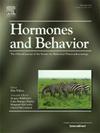复方口服避孕药有长期效果吗?几乎没有证据表明它对前使用者的认知功能有持久的影响
IF 2.4
3区 医学
Q2 BEHAVIORAL SCIENCES
引用次数: 0
摘要
复方口服避孕药(COCs)的使用与当前COCs使用者与非使用者在大脑活动和某些认知、知觉或情感过程中的细微差异有关。在停用COCs后是否存在任何差异基本上是未知的。在对健康成人(N = 221,年龄= 23.78岁)认知数据集的回顾性分析中,我们询问在语言流畅性和视觉空间功能的标准化测试中,是否可以在前使用者(在此之前30个月停止使用COC)中发现COC使用的任何残留影响。有详细的生育史,包括过去使用COC的具体情况。在月经周期的早期卵泡期评估认知能力,此时卵巢处于静止状态,激素分泌最低。根据生殖史,参与者被分为既往COC使用者(N = 86,平均COC使用时间为29.89个月)、从未使用过COC者(N = 106,过去没有使用过激素避孕药)和当前使用者(N = 29,目前正在使用COC,平均COC使用时间为29.72个月)。所有COCs均含有左炔诺孕酮或炔诺酮家族的黄体酮,以及30-35 μg/天的炔雌醇。对比三组认知表现的协方差分析(ANCOVA)显示,尽管使用了雄激素孕激素和雌二醇剂量相对较高,但在任何认知测试中,没有证据表明前使用者和从未使用者之间存在差异。在传统的视觉空间任务(空间关系)中,当前用户的得分低于以前或从未使用过的用户。控制年龄、估计智商和怀孕史的部分相关性显示,前使用者过去COC使用的持续时间与执行的两个音位流畅性任务之一的语言流畅性显着相关。使用COC的时间越长,单词生成能力越差。该数据集几乎没有证据表明使用COC有任何持久的影响,然而,以前使用COC与语言流利度之间的持续依赖关系强化了之前在当前用户中报道的类似趋势。本文章由计算机程序翻译,如有差异,请以英文原文为准。
Do combined oral contraceptives have long-term effects? Little evidence of an enduring effect on cognitive function in former users
The use of combined oral contraceptives (COCs) is associated with subtle differences in brain activity and in certain cognitive, perceptual, or affective processes among current COC users compared with non-users. Whether any differences persist after the COCs are discontinued is essentially unknown. In a retrospective analysis of a cognitive dataset from healthy adults (N = 221, Mage = 23.78 yrs), we asked whether any residual effects of COC use could be identified in former users (who had discontinued their COCs ∼30 mo prior) on standardized tests of verbal fluency and visuospatial function. A detailed reproductive history was available, including specifics of any past COC use. Cognition was evaluated during the early follicular phase of the menstrual cycle when the ovaries are quiescent and hormone production is lowest. Based on their reproductive history, participants were classified as former users of COCs (N = 86, mean duration of COC use = 29.89 mo), never-users (N = 106, no past use of hormonal contraceptives), or current users (N = 29, currently using a COC, mean duration of COC use = 29.72 mo). All COCs contained either levonorgestrel or a progestin from the norethindrone family, and 30–35 μg/day of ethinyl estradiol. Analysis of covariance (ANCOVA) contrasting cognitive performance in the 3 groups showed that despite the use of androgenic progestins and an estradiol dose that was relatively high, there was no evidence of a difference between former-users and never-users on any of the cognitive tests. Current users scored lower than former or never users on a conventional visuospatial task (Space Relations). Partial correlations controlling for age, estimated IQ, and pregnancy history revealed that duration of past COC use in former users was significantly associated with verbal fluency on one of two phonemic fluency tasks administered. A longer duration of COC use was associated with poorer word generation ability. This dataset produced little evidence of any enduring effects of COC use, however a duration-dependent association between former COC use and verbal fluency reinforces a similar trend reported previously among current users.
求助全文
通过发布文献求助,成功后即可免费获取论文全文。
去求助
来源期刊

Hormones and Behavior
医学-行为科学
CiteScore
6.70
自引率
8.60%
发文量
139
审稿时长
91 days
期刊介绍:
Hormones and Behavior publishes original research articles, reviews and special issues concerning hormone-brain-behavior relationships, broadly defined. The journal''s scope ranges from laboratory and field studies concerning neuroendocrine as well as endocrine mechanisms controlling the development or adult expression of behavior to studies concerning the environmental control and evolutionary significance of hormone-behavior relationships. The journal welcomes studies conducted on species ranging from invertebrates to mammals, including humans.
 求助内容:
求助内容: 应助结果提醒方式:
应助结果提醒方式:


